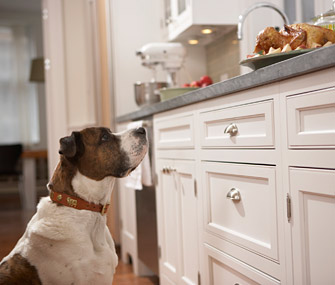4 Tricks for Dealing With Holiday Dog Diarrhea
Published on December 15, 2012
Skip To

So what’s a smart owner to do?
Prevention is the ideal approach, of course. Crating or otherwise isolating dogs during holiday gatherings is doubtless the best way to deal with dietary indiscretions. Nonetheless, plenty of us are unwilling to sequester our pets during this time. The holidays are all about family, after all, and pups are loved ones too.
Controlling what dogs, in particular, consume can be a complex endeavor when our attention is elsewhere — if not on our guests, then perhaps on that tasty eggnog. But not to worry — mild diarrhea is almost always amenable to simple, nondrug interventions that many board-certified clinical pharmacologists recommend.
Just be sure to consult with your veterinarian first if your pet does show signs of diarrhea. And if the diarrhea is profuse, tarry or visibly bloody — or you notice other symptoms, such as vomiting or a change in activity levels — visit your veterinarian immediately.
1. Switching to Bland Food
This is the first recommendation that most veterinarians make. Commercially available, low-fat prescription diets are ideal for pets with simple diarrhea, but you can always ask your vet for a simple, short-term recipe that you can prepare yourself.Most veterinarians will recommend that you keep the bland diet going for at least a day after your dog’s stools return to normal. Afterward, your vet will likely recommend that you gradually mix decreasing portions of the prescription food with increasing portions of his regular diet over the course of three days or so until your dog is back to eating only his normal diet.
2. Skipping a Meal
For the average canine, a missed meal or two is no big shock to the system — this is definitely not the case for cats! — so veterinarians will often recommend forgoing feedings for a bit to let the belly rest. So talk to your vet about this possible approach if your dog does come down with diarrhea.3. Offering Probiotics and Prebiotics
Defined by the World Health Organization as “live microorganisms, which when administered in adequate amounts confer a health benefit on the host,” probiotics are one of modern medicine’s recent innovations.Probiotics function to relieve diarrhea, flatulence and even constipation by adding beneficial bacteria to the intestines. Moreover, we’re learning that they help maintain the intestinal immune system, influence the proliferation of intestinal cells and even help keep our bodies from expending too much energy when extracting nutrients from our foodstuffs.
Probiotics are formulated as oral supplements. They come in the form of capsules, tasty chews, single-dose envelopes of powder and even in food marketed “for intestinal health.”
Just be sure to ask your veterinarian to recommend the right brand.
Prebiotics are nondigestible, fibrous food additives that serve as a nutritious boost to the colonies of “good” bacteria that live in the intestines. Psyllium is the most commonly recommended prebiotic, and your veterinarian needs to supply you with the correct dose for your pet’s size.
4. Providing Electrolytes
Soft stools can lead to dehydration, so veterinarians can suggest both veterinary and commercially available electrolyte-spiked fluids. The fluids will not resolve the diarrhea, but they will help your pet regain proper fluid balance.These “tricks” will almost always fix a simple bout of loose stool. But if they don’t start to firm up in 24 hours, it’s time to see a professional.
Of course, holiday diarrhea doesn’t have to happen. It bears repeating that some simple advance measures — including stern warnings to friends and family to avoid feeding dogs any people food — can make all the difference for your pets’ bellies this time of year.
Check out more opinion pieces on Vetstreet.





